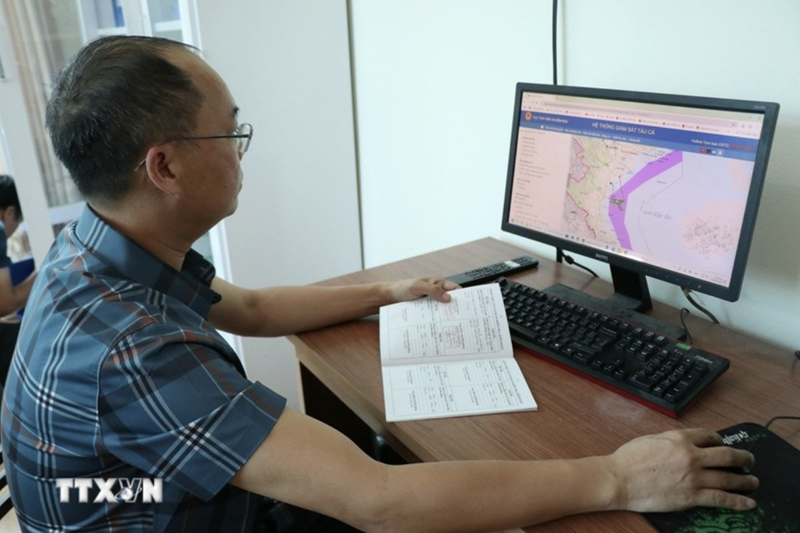Under the strong direction of the Prime Minister, the peak action month against illegal fishing is being implemented nationwide, focusing on strict fleet management, voyage monitoring, transparent traceability, and tough penalties for violations, demonstrating Vietnam’s firm commitment to sustainable and responsible fisheries development.
    |
 |
|
Inspecting fishing vessel data on the vessel monitoring system |
At the 18th meeting of the National Steering Committee on Combating IUU Fishing, the Prime Minister directed ministries and localities to complete licensing of all eligible fishing vessels, ban unqualified boats from setting sail, ensure the installation of vessel monitoring systems (VMS) on all vessels, and end all cases of VMS disconnection.
He also requested the upgrading of qualified fishing ports and the completion of national fisheries traceability and data systems.
The campaign aims to establish a unified and long-term management mechanism for combating IUU fishing and fostering sustainable and responsible fisheries aligned with international standards. Immediate priorities include addressing existing weaknesses, fulfilling the European Commission (EC)’s recommendations, and ensuring Vietnamese seafood meets global market requirements for legality and traceability, thereby enhancing the reputation of Vietnam’s seafood industry worldwide.
The Prime Minister stressed that these efforts go beyond removing the “yellow card”, but also aim to promote sustainable fisheries, protect the interests of both the nation and fishermen, uphold international environmental responsibilities, contributing to maintaining national defense and security and safeguarding sea and island sovereignty.
Vietnam targets to complete all relevant legal reforms, including stricter penalties, expanded authority for competent authorities, particularly at the commune level, and full digital management of the fishing fleet, traceability, and law enforcement by November 15, 2025.
According to the Directorate of Fisheries and Fisheries Surveillance, the electronic catch documentation and traceability system (eCDT) has significantly improved transparency and interoperability with international systems such as the EU’s CATCH and FAO’s CDS.
From January to October 2025, the number of vessel departures recorded on eCDT increased by nearly 80%, arrivals by 139%, and landed seafood volume by 41%. Issued certificates for seafood materials (SC) and catch origin (CC) rose by 290% and 785% year-on-year, respectively.
Deputy Director of the Directorate Vu Duyen Hai said that digital infrastructure upgrades are enabling fishermen to update data easily via platforms such as VNeID, Border Guard, e-logbook, and eCDT.
He noted that the Directorate is expanding traceability coverage nationwide to prevent IUU-sourced seafood from entering domestic or export markets. Data on imported seafood from foreign vessels is also being integrated into Vietnam’s National Single Window to ensure compliance with the Port State Measures Agreement (PSMA).
All fishing vessels, ports, processors, and traders are now required to record and trace their catches electronically. Vessels of six meters or longer must update departure and landing information on eCDT and maintain e-logbooks as instructed by the Ministry of Agriculture and Environment, he said.
For imported seafood, Vietnam has followed the PSMA, establishing mechanisms for information exchange and verification with flag states, controlling records, and monitoring imported seafood at seaports, processing plants, and export points, ensuring that illegally harvested seafood does not enter the supply chain.
For imported seafood, Vietnam enforces strict port-state measures, verifying vessel flag-state information, and monitoring seafood at seaports, processing facilities, and export terminals to prevent illegally caught fish from entering supply chains.
Hai underscored that Vietnam is implementing synchronous measures to combat IUU fishing and develop sustainable fisheries, including managing registration and fishing permits through the national VNFishbase database; monitoring vessel routes and electronic traceability; strictly handling violations; and digitizing all fishing activities to prevent illegal seafood from circulation, processing, or consumption. The interconnected data system ensures end-to-end management, transparent traceability, eliminates fraud, and is ready to connect with international traceability systems.
Alongside digital transformation, competent agencies and localities have strengthened inspections and monitoring to detect and strictly handle IUU violations. To date, law enforcement forces has initiated 21 cases involving 22 individuals and prosecuted one case engaging two individuals for illegal fishing activities.
With strong government direction, close coordination among ministries and localities, and visible progress in management, surveillance, and handling of violations, Vietnam is steadily advancing toward having the EC’s “yellow card” lifted and developing a modern, responsible, and sustainable fisheries sector that contributes to marine economic growth and international integration.
Source: VNA